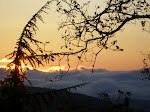This blog, timidly begun in 2012, really got underway in July 2013 as a way of sharing photographs I had taken 50 years earlier during my first research trip to New Guinea. Those photographs tracked the major events of my husband’s and my stay in 1963 among the Maring people of the Simbai Valley from July to November, 1963. The original photos are archived at ODSAS in France.
To "get into the story" at the beginning, go to the Blog Archive and start with 2013, July. To get into the second part of the story, open the Blog Archive in 2020, July. In both cases, you will see the list of posts in chronological order from earlier till later, like a usual table of contents.
The "Fifty Years Ago Today" series, published here exactly 50 years later to the day, created the context for the new story which began in April, 2014. This story led to my return to the Simbai Valley with my granddaughter, Shiva, and daughter, Alvilda, in July, 2014.
I am telling this story now, in 2020 and 2021, six years and more after the events took place, events which now can be more clearly seen and placed in the on-going history of Papua New Guinea (PNG). I hope that the ever-increasing spread of cell-phones and internet throughout PNG will offer my old friends, and their children and grandchildren, access to my stories - right up to the high ridges of the Bismarck Mountains.
Blogging provides a new genre for me, somewhere between writing, film-making, and the website "Maring Interactive" which I helped create between 1996 through 2011. As I reflect on the photographs and videos taken in 2014 by Alvilda, myself, and the WhatTookYouSoLong team, memories are awakened. Meanings arise from a weaving of memories and images. I try to stick to documentary veracity by keeping the images in their original chronological order, but that desire is often thwarted as there was not an easy synchronization between the various cameras.....or between the different perspectives and experiences of the various participants to the events.
As I have become more ambitious, including more events and photos than in the first series, I find that composing a post now takes me much longer than it did in 2013. I have also discovered that I can break from my earlier convention of literally choosing and posting photos from precisely the day 50 years before. I don't have to "write up" the photo/video documents of each day's events in just one day. That had, in fact, become impossible as just selecting and making screen shots of the major moments of each major event can require more than a day's work.
When I discovered that the Blogger software allows one to change the date of posting, I was elated. This allows me not only to take as many days as necessary to compose one post, but also allows me to interdigitate newly composed "chapters" between ones already complete. Of course, this has meant that the project is stretching like an endless elastic band into the future.
In point of fact, it was only on July 1, 2020 that I first wrote this "introduction," using it as a spring-board into the 2014 materials I had not yet worked with. And now, on January 29, 2021, I still haven't even completed the story of the trip to Gundai which ended on July 18, 2014. And there remain tales to write up from then onward to Goroka and Madang, through to my departure from PNG at the end of August, 2014.
Will I manage to finish by August 31, 2021?
P.S. This post, originally published on January 29, 2021, will now serve as an introduction to the Blog as a whole. As such, it will always appear first when a reader clicks on "Turningwiththeearth.blogspot.com". I will change its publication date as I create new posts, sandwiching them in before this one.
<<<>>><<<>>><<<>>><<<>>>





























































